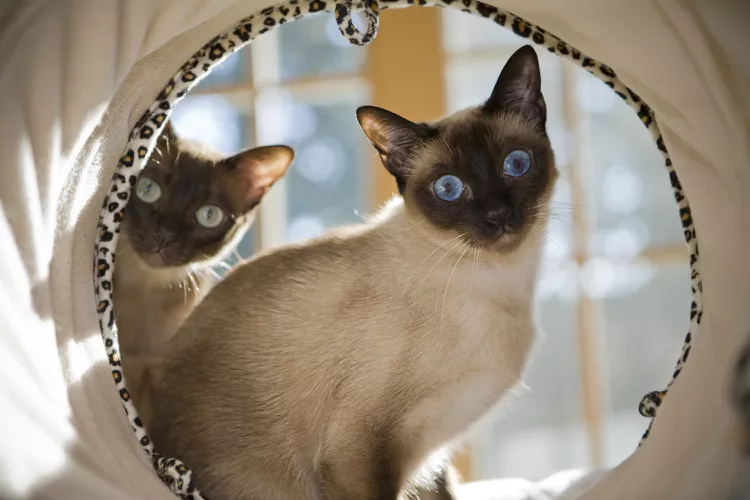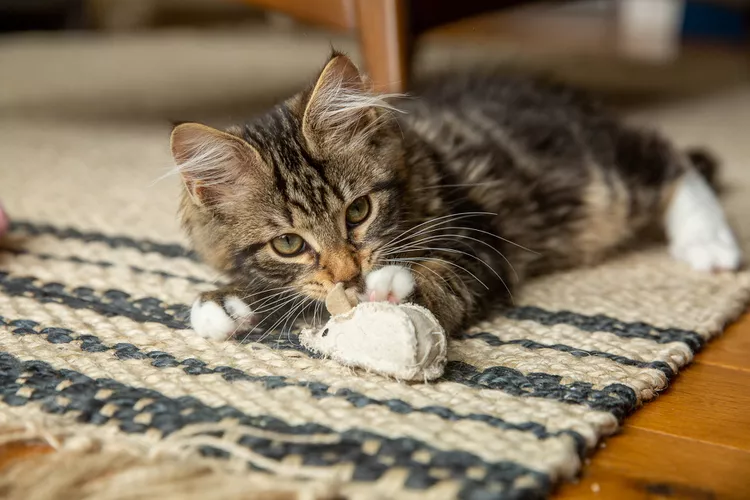
Cat owners may unfortunately become aware of the discomfort and inconvenience of a skunk spray situation. It may surprise some people to hear that cats also get sprayed by skunks from time to time. The debate on whether or not cats should be allowed to roam outside or not can get pretty heated in some circles and I won't get into the detailed pros and cons of either side in this article.
However, if you allow your cat to roam outdoors, you should stay aware of things that your cat may encounter that an indoor-only cat would not, and that includes skunks.
Skunks are native to North and South America and are related to such critters as badgers and otters. Many closely related species can create their very own, pungent, musky odor in their scent glands but skunks are the only ones with the ability to forcefully spray it up to 15 feet.
Skunk spray is produced in the anal glands of the skunk and used for self-defense. It is a yellow oil composed of several different compounds including thiols. Thiols can bind quickly and strongly to skin proteins and have a "rotten egg" odor that also irritates the eyes and lungs. When a skunk is scared, they can and will spray this liquid directly at whatever is pursuing them.
If your cat gets skunk spray in or near its eyes they may become red and irritated. If this happens you will want to immediately flush your cat's eyes out. There are different products available on the market that are safe to use in this way but the best option is an over-the-counter sterile eye wash. If you live in an area where skunks are common, it wouldn't hurt to keep some on hand. If skunk spray gets in your cat's mouth or nose, you may also see such signs as drooling, vomiting, nausea, or sneezing. Skunk spray can also, in rarer cases, cause serious and acute anemia in cats. If you are seeing any symptoms of spray in your cat's eyes, mouth, or nose, take your cat to the vet immediately. It is also important to keep in mind that skunks, like many wild mammals, can carry infectious diseases including rabies. You should always make sure your cat is up-to-date on vaccines and contact your vet if you suspect there was a physical encounter in addition to the spray.
If your cat seems to have gotten away from its skunk encounter with just a noxious smell you will still want to get rid of the smell. In years past, homemade tomato juice-based recipes were the remedy of choice, but the results weren't always the greatest.
Instead of tomato juice, the most effective homemade remedy to de-skunk your cat, after consulting a veterinarian, is to make a solution of one quart of 3% hydrogen peroxide, one-fourth of a cup of baking soda, and one to two teaspoons of liquid hand soap. You will want to wear rubber gloves as you work this solution into your cat's coat before rinsing him thoroughly. It's important to not leave the solution on too long, as the peroxide may bleach your cat's fur after prolonged exposure. You also want to be sure to use only 3% hydrogen peroxide and not anything stronger as it can be more irritating to your cat's skin. Make sure to keep this solution away from your cat's eyes as it can sting and cause irritation to the corneas. You also need to throw the solution out after a few hours as it can explode if left sitting for too long.
You may need to repeat this bath if your cat is particularly smelly. If the idea of bathing your cat has you reconsidering just how noxious the smell is, you can try doing a sponge bath type of treatment. Instead of completely dousing your cat with water, use a wet washrag to dampen their fur and then again to work the solution in. Once you are ready to rinse, use a fresh wet rag to wipe the solution out of your cat's fur. If there is only one area of your cat's fur that got sprayed, feel free to only wash that area.
If any skunk smell gets on you during any part of this process you will want to wash your clothes in regular laundry detergent and one-half a cup of of baking soda.
There are measures you can take to make your yard less attractive to a skunk. Securely seal your outside trash receptacle to prevent a skunk from getting into your garbage. If you feed your cat outdoors, pick up the food and water bowls at night. If you have a porch or shed, a skunk might find the area underneath those structures desirable for a den. You can block access by tacking chicken wire all around or laying bricks all around.
Knowing the steps you can take if your cat has a not-so-nice encounter with a skunk can be the difference between something you can laugh about later and something that can really put a damper on how your day is going.

10 Obscure, Little-known Canine Facts in Honor of National Dog Day
With National Dog Day upon us, it's time to celebrate everything about our favorite pets—even the weirder stuff. Here are 10 obscure facts about dogs you probably didn't know.
Exploring the Different Types of Pet-Friendly Beaches
Are you looking for pet-friendly beaches? Learn about the different types of pet-friendly beaches, their locations, and tips for visiting them with your pet.
Toxic Chemicals & Household Items That Can Poison Dogs
There are many things in and around your home that can endanger your dog. Learn which chemicals and household items can poisin your dog.
Bronchitis in Dogs
Is your dog coughing and feeling unwell? It could be due to respiratory inflammation called bronchitis. Learn the causes, treatment, and prevention.
Choking in Dogs
A dog can occasionally swallow something incorrectly and start choking. Find out how you can tell if your dog is choking and what you can do about it.
Why Does My Dog Smell So Bad?
Does your dog smell? Find out what could be causing these unpleasant odors and if it's something that needs more than just a bath to fix.
Is Rosemary Safe for Dogs?
Rosemary is used both for cooking and as a supplement with many reported health benefits in people, so you may be wondering if it is safe to give to your dog. Rosemary is considered non-toxic for dogs but with some caveats.
Can Dogs Eat Blueberries?
Dogs can safely eat blueberries. Blueberries are packed with nutrients and can be a great addition to your dog's diet when fed in moderation. Learn more about the benefits, risks, how to incorporate blueberries into their diet, and other fruits dogs can eat.
Dog Food Basics
Are you feeding your dog the best way possible? Check out these dog feeding tips to keep your dog healthy and happy.
Swedish Vallhund: Dog Breed Characteristics & Care
The Swedish vallhund makes for a high-energy and affectionate companion. Learn about the breed's history, health, exercise needs, and more.
Becoming a Show Dog: Getting Started
Do you have the perfect puppy? Have you considered showing her in a dog show? There's much more to showing than showing up! Here's how to get started.
How to Care for a Hairless Cat
Hairless cats make great pets but they aren't without their own challenges and requirements. Read on to learn how to best care for your furless feline.
British Shorthair: Breed Profile, Characteristics & Care
The British Shorthair is a calm, affectionate cat that looks and feels like a plush teddy bear. Here's what you need to know about this popular breed, including appearance, temperament, health, and care.
Tonkinese: Cat Breed Profile, Characteristics & Care
The Tonkinese cat is a perfect mix of the Siamese and Burmese—smart, sociable, and sweet. Learn about the Tonkinese breed.
How to Stop Your Cat From Chewing Electrical Cords
Cats are known to pounce and attack inanimate objects, like electrical cords. Learn how to prevent your cat from ambushing objects that may harm it.
How to Stop Aggression in Kittens
Kittens may show aggressive behavior for several reasons. Sometimes their play gets too aggressive while other times the kitten is afraid or upset. Learn how to spot and curb aggression in kittens.
46 Egyptian Cat Names
Whether inspired by notable Egyptian deities, locales, or pharaohs, Egyptian cat names can bring out the divinity of your noble feline companion.
How to Tell If a Kitten is a Boy or a Girl
If you're wondering whether your new kitten is a boy or a girl, here are three ways to help determine the sex of your cat.
Signs Your Cat Is Aging and When to See the Vet
Expect some changes when your cat ages. Learn to differentiate between normal and potential medical problems for your elderly cat.
Coronavirus in Cats
Feline coronavirus (FCoV) rarely harms cats but can lead to another life-threatening illness. Learn the causes, treatment, and prevention.